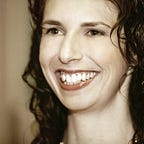Removing the Middle Human
Montreal, Quebec 2050
It’s 2050 and we meet Dwyane Frontiere, a COVID Kid. He was born in 2021 in a quarantined village in the nation of Quebec (formerly a province in Canada). In the 2020’s, most of Dwayne’s life would have been mediated through a middle person; like a family doctor, a real estate agent, or a job talent agency. As a 30-year old he gets more of what he needs on demand through machine learning and 24 hour Ask an Expert services. This way to interact with experts influenced the relationship between elected officials and citizens in his home town. This link between rhetoric and broken promises became known as a “404” during the Great Internet Pause of 2043. Originally referring to a page not found on the internet, a 404 became the colloquial way of saying, “That’s an error, and we both know it.” In creating a political noise-cancelling system they identify civic leaders for their subject matter expertise. They removed a human barrier to good governance with ethical AI.
At 21, Dwayne moved to a neighbourhood in Montreal that was early to adopt the guidelines for ethical smart cities. Dwayne now lives in a small condo in Place Ville-Marie, a converted skyscraper in downtown Montreal. Dwayne’s entire company lives on four floors above him, each in a hermetically sealed unit. This was something familiar from his youth. After working from home became the norm in the 2020’s converted office towers became live/work/nourish studios for employees and their families. This was a physical distancing compromise between working at home and collaborating in person. Thirty years on, teams still collaborate with colleagues on opposite sides of glass meeting walls. In Dwayne’s physical world, his life is a throwback to decades gone by, but his present and future is an evolving landscape of ethical issues, governance structures, and individual rights.
The COVID Crisis created a renaissance era for the multi-disciplinary collaborations between science and humanities to bring people into biotech enlightenment. As a kid, Dwayne’s parents read him bedtime stories inspired by a Smart Cities: Shaping the Society of 2030 report. He now works in in-vivo digital circuits for childhood education. He writes code for children’s songs created by musicians in Smart Cities Accelerator Training Programs. These are songs of the future shaped by the Era of Great Reflection 2020–2027.
The Era of Great Reflection 2020–2027.
The Corona Crisis flattened the curve of populist politics in North America. The global depression in the early 2020’s activated the tipping point for new governance in some locales. The business as usual political structures had suppressed the new forms of economic value. Political agendas and coloured interpretations of expert opinions had killed too many. Also, blunders by politicians distracted voters from the humanitarian crises of people right in front of them. Data scientists demonstrated that politics and capitalism had killed more people in the 20th century than any health related deaths. The citizens of Montreal decided there was no future expecting politicians to lead through any other kind of systemic crisis.
The COVID Crisis helped people to recognize that they have the means for robust collaborations between citizens, leaders, experts and AI. To remove politicians was to cut out biased middle persons and get the facts directly from the source. As a resource, data scientists provide all that people need to make more ethical policies using international standards. Nobel Prize winners had ideas and evidence that transformed society without the filter of political campaigns.
COVID Kids (born between 2015–2030) rallied behind new governance structures that supported collaborative problem solving. For example, they were encouraged by older generations to lead society within Citizens’ Reference Panels. Dwayne is one of thousands of citizen leaders who sits on a Citizens’ Reference Panel. These panels are designed for deliberative democracy, to give citizens a hand in shaping the policies that determine their lives. Like the panelists with him, he was selected because he is mindful, selfless, and compassionate.
Once a month he meets with people from around Quebec in a long-form deliberative processes to advise leadership about the implications of contentious public issues. He knows that he is not alone in his fears. The Citizen Reference Panels are a Village Town Square in cities that do not have them. In this way, some of the stories that the government and the private sector need to hear come from the public and less through the media. A commitment to protecting something greater than a single individual has removed the middle person and society (in Quebec at least) has accepted the egocentric human mediator no more.
Dwayne’s life is a commonly repeated story. He has adapted to complexity by becoming a novice and expert in his own life. He is a novice and expert in community leadership. He is curious and comfortable with uncertainty. He sees growing up with uncertainty a gift that makes him the best contributor to the planet that he can be.
